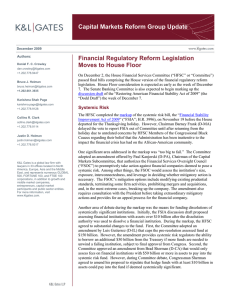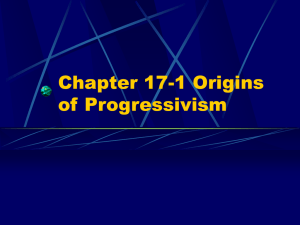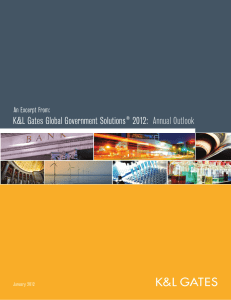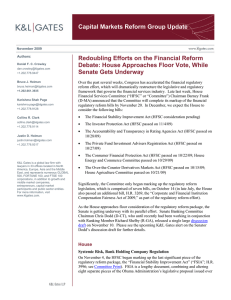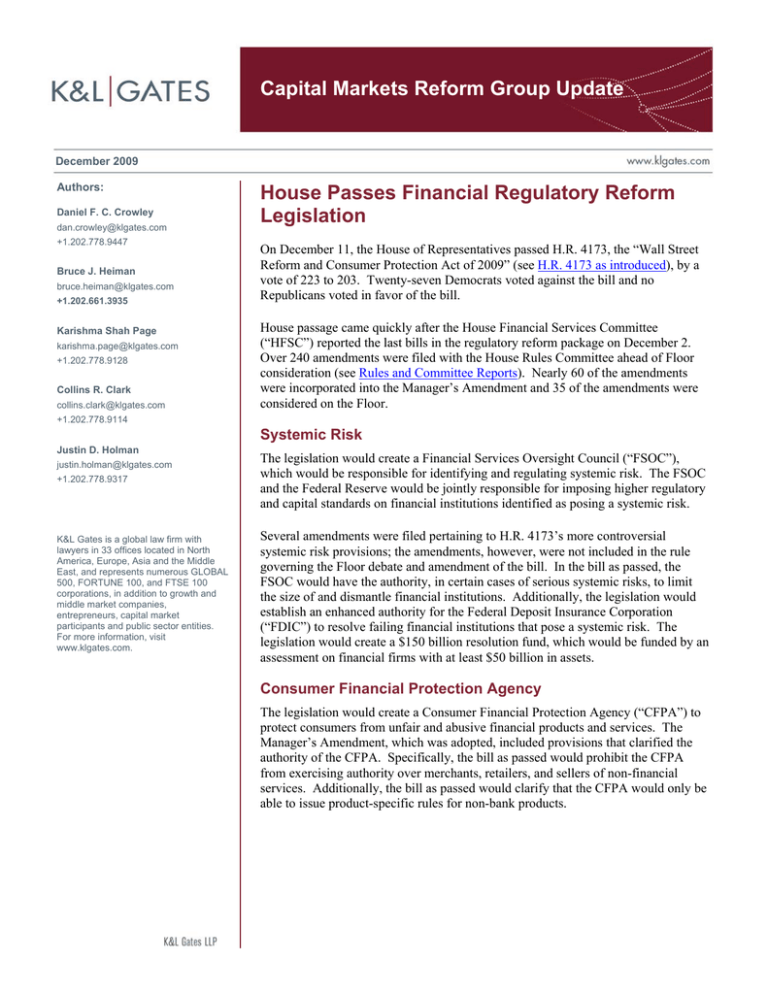
Capital Markets Reform Group Update
December 2009
Authors:
Daniel F. C. Crowley
dan.crowley@klgates.com
+1.202.778.9447
Bruce J. Heiman
bruce.heiman@klgates.com
+1.202.661.3935
Karishma Shah Page
karishma.page@klgates.com
+1.202.778.9128
Collins R. Clark
collins.clark@klgates.com
House Passes Financial Regulatory Reform
Legislation
On December 11, the House of Representatives passed H.R. 4173, the “Wall Street
Reform and Consumer Protection Act of 2009” (see H.R. 4173 as introduced), by a
vote of 223 to 203. Twenty-seven Democrats voted against the bill and no
Republicans voted in favor of the bill.
House passage came quickly after the House Financial Services Committee
(“HFSC”) reported the last bills in the regulatory reform package on December 2.
Over 240 amendments were filed with the House Rules Committee ahead of Floor
consideration (see Rules and Committee Reports). Nearly 60 of the amendments
were incorporated into the Manager’s Amendment and 35 of the amendments were
considered on the Floor.
+1.202.778.9114
Systemic Risk
Justin D. Holman
+1.202.778.9317
The legislation would create a Financial Services Oversight Council (“FSOC”),
which would be responsible for identifying and regulating systemic risk. The FSOC
and the Federal Reserve would be jointly responsible for imposing higher regulatory
and capital standards on financial institutions identified as posing a systemic risk.
K&L Gates is a global law firm with
lawyers in 33 offices located in North
America, Europe, Asia and the Middle
East, and represents numerous GLOBAL
500, FORTUNE 100, and FTSE 100
corporations, in addition to growth and
middle market companies,
entrepreneurs, capital market
participants and public sector entities.
For more information, visit
www.klgates.com.
Several amendments were filed pertaining to H.R. 4173’s more controversial
systemic risk provisions; the amendments, however, were not included in the rule
governing the Floor debate and amendment of the bill. In the bill as passed, the
FSOC would have the authority, in certain cases of serious systemic risks, to limit
the size of and dismantle financial institutions. Additionally, the legislation would
establish an enhanced authority for the Federal Deposit Insurance Corporation
(“FDIC”) to resolve failing financial institutions that pose a systemic risk. The
legislation would create a $150 billion resolution fund, which would be funded by an
assessment on financial firms with at least $50 billion in assets.
justin.holman@klgates.com
Consumer Financial Protection Agency
The legislation would create a Consumer Financial Protection Agency (“CFPA”) to
protect consumers from unfair and abusive financial products and services. The
Manager’s Amendment, which was adopted, included provisions that clarified the
authority of the CFPA. Specifically, the bill as passed would prohibit the CFPA
from exercising authority over merchants, retailers, and sellers of non-financial
services. Additionally, the bill as passed would clarify that the CFPA would only be
able to issue product-specific rules for non-bank products.
Capital Markets Reform Group Update
The Manager’s Amendment also included a
compromise measure on preemption, which had
been an issue of significant debate during the
HFSC’s consideration of the CFPA Act. Under the
Manager’s Amendment, states would be allowed to
adopt more stringent consumer protections than
those put in place by the CFPA. The Manager’s
Amendment, however, would provide the Office of
the Comptroller of the Currency (“OCC”) with the
authority to make a case-by-case preemption
determination, in consultation with the CFPA, on
standards that it determines materially affect bank
operations.
offered by Congressman Stephen Lynch (D-MA)
which would bar financial holding companies from
acquiring ownership directly or indirectly in a
derivatives clearinghouse if after the transaction the
financial holding company would hold more than 20
percent ownership in the clearinghouse.
Other Amendments
The House-passed bill strikes language that would
have permitted the Financial Industry Regulatory
Authority (“FINRA”) to regulate investment
advisers that are associated with broker-dealers.
The House rejected an amendment offered by
Congressman Walter Minnick (D-ID) and other
Democrats which would have replaced the CFPA
with a 12-member council housed at the Treasury
Department.
On the issue of private fund registration, the House
accepted an amendment filed by Congresswoman
Stephanie Herseth Sandlin (D-SD) which would
require the SEC to take into account the risk profile
of different types of private funds when it
determines the private fund registration regime.
Over-the-Counter (“OTC”) Derivatives
Markets
Next Steps
The House agreed to amendments modifying the
provisions regulating OTC derivatives. The House
approved an amendment filed by HFSC Chairman
Barney Frank (D-MA) clarifying the Commodity
Futures Trading Commission’s (“CFTC”)
jurisdiction over non-security-based swaps and the
Securities and Exchange Commission’s (“SEC)
jurisdiction over security-based swaps. The amended
bill would require that a derivatives clearinghouse
accept a swap for clearing if the CFTC or SEC has
determined that clearing is mandatory for the swap.
Under the amended legislation, the CFTC would
also be required to establish position limits on swaps
that perform a significant price discovery function,
though the CFTC would be authorized to provide
exemptions to position limits. The CFTC would also
be required to set aggregate position limits across all
markets.
The House accepted an amendment filed by
Congressmen Scott Murphy (D-NY), Mike
McMahon (D-NY), and Frank Kratovil (D-MD)
which narrows the definition of “major swap
participant” so that end-users who are neither a
major swap dealer nor pose a systemic risk would be
exempt from the requirements of the legislation.
Also approved was a controversial amendment
Now that the House has completed its consideration
of the financial regulatory reform package, attention
turns to the Senate. Senate Banking Chairman
Chris Dodd (D-CT) released a discussion draft of
the Senate legislation, the “Restoring American
Financial Stability Act of 2009,” on November 10
(for additional information, see K&L Gates alert
Senator Dodd Releases Financial Reform Proposal:
The Restoring American Financial Stability Act of
2009). With the impending Congressional holiday
recess, the Committee is unlikely to begin marking
up the legislation until it returns in mid-January.
The markup is expected to take several weeks,
followed by a lengthy conference proceeding to
reconcile the differences in the House and Senate
bill.
Please see previous K&L Gates updates, including
Financial Regulatory Reform Legislation Moves to
House Floor and Redoubling Efforts on the
Financial Reform Debate: House Approaches Floor
Vote, While Senate Gets Underway, for additional
information and background about the reform effort.
In addition, please see the K&L Gates Global
Financial Market Watch Blog for detailed analysis
on many of the Obama proposals and future
updates.
December 2009
2
Capital Markets Reform Group Update
Anchorage Austin Beijing Berlin Boston Charlotte Chicago Dallas Dubai Fort Worth Frankfurt Harrisburg Hong Kong London
Los Angeles Miami Newark New York Orange County Palo Alto Paris Pittsburgh Portland Raleigh Research Triangle Park
San Diego San Francisco Seattle Shanghai Singapore Spokane/Coeur d’Alene Taipei Washington, D.C.
K&L Gates is a global law firm with lawyers in 33 offices located in North America, Europe, Asia and the Middle East, and represents numerous
GLOBAL 500, FORTUNE 100, and FTSE 100 corporations, in addition to growth and middle market companies, entrepreneurs, capital market
participants and public sector entities. For more information, visit www.klgates.com.
K&L Gates comprises multiple affiliated partnerships: a limited liability partnership with the full name K&L Gates LLP qualified in Delaware and
maintaining offices throughout the United States, in Berlin and Frankfurt, Germany, in Beijing (K&L Gates LLP Beijing Representative Office), in
Dubai, U.A.E., in Shanghai (K&L Gates LLP Shanghai Representative Office), and in Singapore; a limited liability partnership (also named K&L
Gates LLP) incorporated in England and maintaining offices in London and Paris; a Taiwan general partnership (K&L Gates) maintaining an office in
Taipei; and a Hong Kong general partnership (K&L Gates, Solicitors) maintaining an office in Hong Kong. K&L Gates maintains appropriate
registrations in the jurisdictions in which its offices are located. A list of the partners in each entity is available for inspection at any K&L Gates office.
This publication is for informational purposes and does not contain or convey legal advice. The information herein should not be used or relied upon
in regard to any particular facts or circumstances without first consulting a lawyer.
©2009 K&L Gates LLP. All Rights Reserved.
December 2009
3


